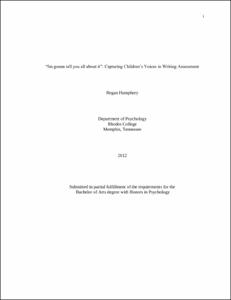Please use this identifier to cite or link to this item:
http://hdl.handle.net/10267/13699Full metadata record
| DC Field | Value | Language |
|---|---|---|
| dc.contributor.author | Humphrey, Regan | - |
| dc.date.accessioned | 2012-05-25T16:46:40Z | - |
| dc.date.available | 2012-05-25T16:46:40Z | - |
| dc.date.issued | 2012-05 | - |
| dc.identifier.uri | http://hdl.handle.net/10267/13699 | - |
| dc.description | The author granted permission for the digitization of this paper. It was submitted by CD. | en_US |
| dc.description.abstract | In today’s educational system, standardized tests play a more important role than ever before. Increasingly, these tests include direct assessments of writing skills; however, there is controversy regarding which facets of writing should be included in these assessments. A particular target of debate is the quality of authorial voice, a unique, personal style of writing. This study explores the relationship between authorial voice and the mechanics of writing, as well as academic performance. Participants – 180 third, fourth, and fifth graders – wrote stories about peer conflict in the fall and spring of one academic year. Stories were coded for two measures of mechanics (conventions and clarity) and four measures of authorial voice (expressiveness, metanarrative comments, cultural voice, and emphasis markers). Students and their teachers also completed the following measures of attitudes and behaviors related to academic performance in the fall and spring: academic self-concept; peer-nominated academic reputation; and teacher-rated academic skills, academic effort, writing ability, and attention problems. The results showed a moderate relationship between authorial voice and mechanics in the fall, but this relationship weakened in the spring. Of all the writing skills, conventions was the strongest predictor of academic performance, particularly for the teacher ratings, although the peer ratings were more sensitive to authorial voice. I suggest that the neglect of authorial voice stems from mechanics-focused state standards, and propose an alternative writing curriculum that uses cultural voice as a springboard to develop other writing skills. | en_US |
| dc.description.sponsorship | This paper was read and approved by Drs. Marsha Walton, Janet Panter, Gaily Murray, and Natalie Person. | en_US |
| dc.publisher | Memphis, Tenn. : Rhodes College | en_US |
| dc.rights | Rhodes College owns the rights to these digital materials which are made available for educational use only and may not be used for any non-educational or commercial purpose. Approved educational uses include private research and scholarship, teaching, and student projects. For additional information please contact archives@rhodes.edu. | - |
| dc.subject | Text | - |
| dc.subject | Psychology, Department of | en_US |
| dc.subject | Honors papers | en_US |
| dc.subject | Student research | en_US |
| dc.title | "Im gonna tell you all about it": Capturing Children's Voices in Written Assessment | en_US |
| dc.type | Thesis | en_US |
| Appears in Collections: | Honors Papers | |
Files in This Item:
| File | Description | Size | Format | |
|---|---|---|---|---|
| Humphrey_Regan_Honors_2012.pdf | 472.94 kB | Adobe PDF |  View/Open |
Items in DSpace are protected by copyright, with all rights reserved, unless otherwise indicated.